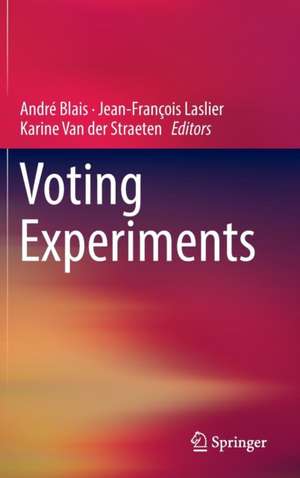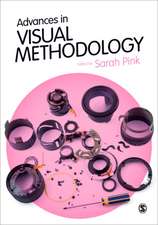Voting Experiments
Editat de André Blais, Jean-François Laslier, Karine Van der Straetenen Limba Engleză Hardback – 11 oct 2016
| Toate formatele și edițiile | Preț | Express |
|---|---|---|
| Paperback (1) | 699.12 lei 6-8 săpt. | |
| Springer International Publishing – 16 iun 2018 | 699.12 lei 6-8 săpt. | |
| Hardback (1) | 705.51 lei 6-8 săpt. | |
| Springer International Publishing – 11 oct 2016 | 705.51 lei 6-8 săpt. |
Preț: 705.51 lei
Preț vechi: 830.00 lei
-15% Nou
Puncte Express: 1058
Preț estimativ în valută:
135.00€ • 141.31$ • 112.36£
135.00€ • 141.31$ • 112.36£
Carte tipărită la comandă
Livrare economică 31 martie-14 aprilie
Preluare comenzi: 021 569.72.76
Specificații
ISBN-13: 9783319405711
ISBN-10: 3319405713
Pagini: 428
Ilustrații: VIII, 333 p. 35 illus., 25 illus. in color.
Dimensiuni: 155 x 235 x 21 mm
Greutate: 0.66 kg
Ediția:1st ed. 2016
Editura: Springer International Publishing
Colecția Springer
Locul publicării:Cham, Switzerland
ISBN-10: 3319405713
Pagini: 428
Ilustrații: VIII, 333 p. 35 illus., 25 illus. in color.
Dimensiuni: 155 x 235 x 21 mm
Greutate: 0.66 kg
Ediția:1st ed. 2016
Editura: Springer International Publishing
Colecția Springer
Locul publicării:Cham, Switzerland
Cuprins
Part 1: Processing information about candidates / Voting correctly.- Deciding correctly: Variance in the effective use of party cues.- The company makes the feast. Party conflict and issue voting in multi-party systems.- Candidate extremity, information environments, and political polarization: Three experiments in a dynamic process tracing environment.- Common knowledge and voter coordination: Experimental evidence from Mali.- Part 2: Impact of polls on the decision to vote or to abstain.- Are people more or less inclined to vote when aggregate turnout is high?- Visibility and sanctions: The social norm of voting in the lab.- Part 3: Impact of polls on candidate choice: bandwagon effect and strategic voting.- Experiments on the effects of opinion polls and implications for laws banning pre-election polling.- Polls, partisanship, and voter decision-making: An experimental analysis.- Coalitions, coordination and electoral choice: A lab experimental study of strategic voting.- Patterns of strategic voting in run-off elections.- Strategic voting and personality traits.- Part 4: Methodological debate and innovations.- Individual behavior under evaluative voting: A comparison between laboratory and in situ experiments.- Recruiting for laboratory voting experiments: Exploring the (potential) sampling bias.- Measuring perceptions of candidate viability in voting experiments.- Electoral system and number of candidates: Candidate entry under plurality and majority runoff.- Through the polling booth curtain – a visual experiment on citizens’ behavior inside the polling booth.
Recenzii
“Volume includes enough experimental research to make readers think twice about a decision to move to a multiparty state. … book has much to teach readers who hope to preserve their self-interest by contemplating a move from a dual-party system to a multi-party system. Contributors to Voting Experiments have defined most of their theoretical concepts clearly enough for readers who are not familiar with the disciplinary language found in political science and economics to be able to follow their arguments.” (Theresa A. Thorkildsen, PsycCRITIQUES, Vol. 62 (11), March, 2017)
Notă biografică
Karine Van Der Straeten, Toulouse School of Economics, CNRS, Toulouse, France
Jean-François Laslier, Paris School of Economics, CNRS, Paris, France
André Blais, Université de Montréal, Département de science politique, Montréal, QC, Canada
Jean-François Laslier, Paris School of Economics, CNRS, Paris, France
André Blais, Université de Montréal, Département de science politique, Montréal, QC, Canada
Textul de pe ultima copertă
This book presents a collection of papers illustrating the variety of "experimental" methodologies used to study voting. Experimental methods include laboratory experiments in the tradition of political psychology, laboratory experiments with monetary incentives, in the economic tradition, survey experiments (varying survey, question wording, framing or content), as well as various kinds of field experimentation. Topics include the behavior of voters (in particular turnout, vote choice, and strategic voting), the behavior of parties and candidates, and the comparison of electoral rules.
Caracteristici
First book that gives a comprehensive overview of experimental methods in the study of elections Covers all types of experiments: in the laboratory, in the field, and in surveys Covers the study of voting, but also party and candidate strategy















